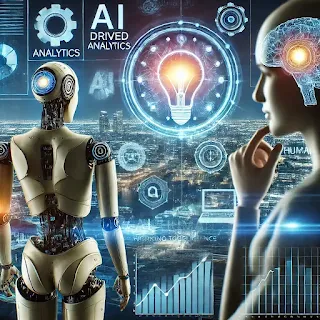Introduction
Artificial Intelligence (AI) has made remarkable advancements in recent years, revolutionizing industries and automating tasks that once required human intelligence. From self-driving cars to AI-powered medical diagnostics, AI continues to evolve at a rapid pace. However, despite these impressive developments, the question remains: Can AI truly replace human intelligence?
While AI excels in processing vast amounts of data, performing repetitive tasks, and even mimicking cognitive functions, human intelligence is far more complex, characterized by creativity, emotional understanding, ethical reasoning, and adaptability. This article explores the capabilities and limitations of AI compared to human intelligence, the role of AI in the workforce, and the future of AI-human collaboration.
Understanding AI: Its Capabilities and Limitations
AI refers to the simulation of human intelligence in machines, enabling them to perform tasks such as problem-solving, learning, decision-making, and language understanding. AI is generally classified into two main categories:
Narrow AI (Weak AI): Designed to perform specific tasks, such as virtual assistants (e.g., Siri, Alexa), recommendation algorithms, and fraud detection systems.
General AI (Strong AI): A hypothetical AI that possesses human-like cognitive abilities, allowing it to perform any intellectual task a human can do. As of now, General AI remains an unachieved concept in the field of AI development.
How AI Compares to Human Intelligence
1. Speed and Efficiency
AI can process large amounts of data at incredible speeds, far surpassing human capability.
Algorithms can analyze patterns, predict trends, and provide insights within seconds.
However, humans excel at adaptive learning and making decisions based on experience rather than just data.
2. Creativity and Innovation
AI can generate art, compose music, and even write literature using machine learning models (e.g., OpenAI’s GPT-4, DALL·E for images).
However, AI lacks true creativity as it relies on existing data and cannot generate original thoughts or break away from predefined patterns.
Human intelligence thrives on abstract thinking, imagination, and emotional expression.
3. Emotional Intelligence and Empathy
AI can recognize human emotions through facial recognition and sentiment analysis.
However, it does not experience emotions or truly understand human feelings.
Human intelligence is deeply connected to empathy, social relationships, and ethical reasoning, which AI cannot replicate.
4. Decision-Making and Ethical Judgments
AI can make data-driven decisions, such as financial trading, medical diagnosis, and fraud detection.
However, ethical decision-making is complex and requires moral values, intuition, and cultural awareness—traits that AI lacks.
Humans consider multiple perspectives, emotions, and long-term consequences in decision-making, which AI cannot fully grasp.
The Role of AI in the Workforce: Will It Replace Jobs?
AI’s ability to automate tasks has raised concerns about job displacement. While AI can replace certain roles, it is also creating new opportunities.
1. Jobs That AI Can Replace
AI is highly effective at automating repetitive and predictable tasks, making the following jobs more susceptible to AI takeover:
Data entry and processing
Customer service chatbots
Manufacturing and assembly line tasks
Basic financial analysis
2. Jobs That Require Human Intelligence
Certain roles require human reasoning, creativity, and emotional intelligence, making them difficult to automate:
Healthcare professionals (doctors, therapists, nurses)
Artists, writers, and musicians
Teachers and educators
Legal professionals and ethical decision-makers
While AI may assist in these fields, human expertise remains essential for complex problem-solving and interpersonal interactions.
The Future: AI as a Complement to Human Intelligence
Instead of replacing human intelligence, AI is more likely to enhance human capabilities, leading to an era of AI-human collaboration.
1. AI as a Supportive Tool, Not a Substitute
AI can automate tedious tasks, allowing humans to focus on creative and strategic thinking.
In medicine, AI helps doctors diagnose diseases faster, but human doctors provide compassionate care and ethical decision-making.
In education, AI-powered tutors support learning, but teachers offer mentorship and emotional support.
2. The Rise of Human-AI Collaboration
AI tools like co-pilots in software development help programmers write code efficiently.
AI-powered design assistants enhance creativity but do not replace human designers.
AI-driven data analysis improves business strategies, but human leadership is needed for decision-making.
Ethical and Philosophical Considerations
1. Can AI Achieve Consciousness?
Some researchers speculate that future AI could develop self-awareness, but current AI models lack any form of consciousness or subjective experience.
Human intelligence is deeply tied to biology, emotions, and existential awareness, which AI does not possess.
2. The Need for AI Ethics and Regulations
AI must be used responsibly to avoid biases, discrimination, and misinformation.
Governments and organizations need to implement ethical guidelines to ensure AI serves humanity rather than replacing it.
Conclusion: Can AI Truly Replace Human Intelligence?
While AI is transforming industries and improving efficiency, it cannot fully replace human intelligence. The unique traits that define human cognition—creativity, emotional intelligence, ethical reasoning, and consciousness—remain beyond AI’s reach.
Instead of fearing AI as a competitor, we should embrace it as a powerful tool that complements human intelligence. The future lies in collaboration, where AI enhances human potential, drives innovation, and helps solve complex global challenges.

No comments:
Post a Comment